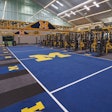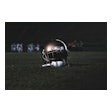As lacrosse has increased in popularity among both male and female participants in recent years, so have the number of brain injuries attributable to the sport. Lacrosse ranks third in diagnosed concussions among high school female athletes, according to the Florida Hospital Sports Concussion Program, and only hockey and football have higher concussion rates than men's lacrosse. To address the issue, Major League Lacrosse has teamed up with Boston-based brain trauma research organization Sports Legacy Group to develop and implement a comprehensive concussion plan for the 2013 season.
"Concussions are a critical issue in sports today," says MLL commissioner David Gross. "We asked SLI, the experts in the field, to develop the most aggressive program in professional sports so that we can protect our players' long-term health, ensure longevity of their careers and set a strong example for youth and college sports programs to make concussion care and training a priority."
Combining practices already in use by other major sports leagues with many of the recommendations set forth by SLI in recent years, as well as the incorporation of a first-of-its kind caregiver-education concept, the policy will address the following key issues, according to SLI medical director Robert Cantu and executive director Chris Nowinski:
• Education: To accelerate culture change, MLL players will participate in two educational sessions, one before and one during the season, as well as be required to complete an online training program and view the SLI documentary "Head Games". Coaches, general managers, referees and medical personnel will all be required to meet a minimum educational standard.
• Remove-From-Play: MLL will become the first professional sports organization to mandate the King-Devick test - an objective rapid sideline screening test of concussions that a growing body of studies show is an effective test for concussion -- as an additional sideline assessment tool.
• Concussion Check: Adopting a new concept developed by SLI, MLL will pilot a program designed to improve concussion reporting by training MLL personnel to recognize concussion signs and symptoms and emphasize that they have a responsibility to alert the team medical staff or referee. If a teammate, coach, general manager, athletic trainer, physician/doctor, equipment manager, opposing team physician or referee triggers a concussion check, the player must be removed and evaluated by the medical team using the new MLL Sideline Assessment Tool.
• Concussion Caretaker: When a player is diagnosed with a concussion, MLL medical staffs will educate at least one family member and/or caretaker, designated by the player before the season, on concussion management and how to support an athlete recovering from a concussion - another new concept developed by SLI.
• Research: MLL will encourage teams to participate in innovative research, including participating in the SLI Hit Count Initiative, and encouraging players to participate in research programs, including the brain donation program at the Boston University Center for Study of Traumatic Encephalopathy.
The program comes amid calls for better rules and standards for both men's and women's lacrosse, specifically in regard to helmets. In February, legislators in Maryland voted down a bill that would require female lacrosse players to wear helmets, a law many believe would have increased the risk of brain injury among lacrosse players.
"Girls' lacrosse is a game that, typically, does not involve contact between the players," Wheaton Metro Lacrosse coach Alanna Waters said of the bill. "I think that the lacrosse community appreciates the concern that lawmakers have for the safety of the players; however, it is important that any legal actions taken with regard to any sport consider the nature of the sport and the best ways to protect its athletes. While preventing concussions and other head injuries is certainly important, this is not necessarily the best way to go about doing it."
In contrast, men's lacrosse currently requires all players to wear helmets, a rule that many argue contributes to the increased physical nature and resulting injuries of the sport. In a study conducted by Medstar Sports Medicine Research Center in Baltimore analyzing concussions suffered by high school boy's lacrosse players in Fairfax County, Va., 34 videotaped concussions all resulted from player-to-player contact, and in three-quarters of incidents, the striking player's head was the initial point of impact.

































